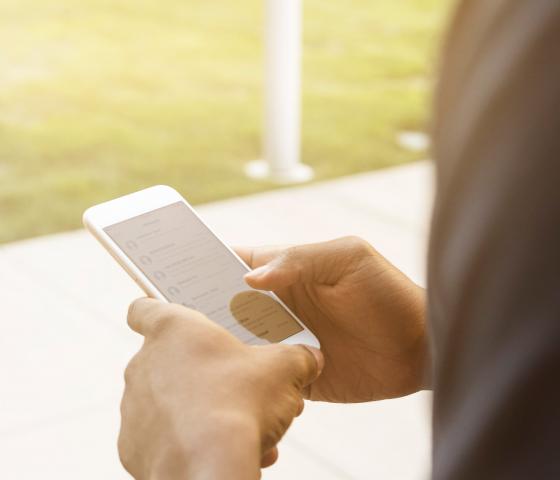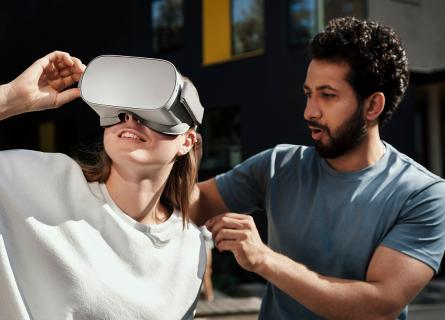
Establish control over personal data with Blockchain technology
Blockchain in times of Covid-19 pandemic
Our lives revolve around technology, and various devices such as smartphones, smartwatches, and health trackers are always collecting data about us. This data contains all information about our health statistics, location, and in some cases, what we are planning to do next. Leveraging blockchain, can be a massive benefit towards establishing control of data, writes Prajit Datta, Future Technologies at AFRY.
Recently this matter has gained extra spotlight due to the Covid-19 pandemic. In the US, Apple and Google has built in a software in iPhone and Android that use wireless Bluetooth technology. Several other countries have rolled out apps that help detect and trace coronavirus cases among the citizens. But this raised questions about privacy concerns. For example, the Norweigan app Smittestopp got withdrawn after warnings from Amnesty that the app was too intrusive.
With such an extensive collection of data that gets sent to private companies, it gives them immense power over information and privacy of general people. This situation begs the question of how organizations are using data beyond the services they provide and what happens when a data breach occurs on their storage server.
Although previously regions of the high population such as the European Union have launched GDPR, still we cannot be assured of the usage of our private information. Information technology giants consistently accumulate our information as consumers and store it as a digital identity for further implementation. The benefit that storing personal data about consumers is paramount for such companies while consumers get no control over how their credentials and information is stored and utilized. A definite step in this endeavor is taken by using blockchain technology to leverage control over personal data and hand it directly to the customers.
Concerns over health data
From all the data that organizations collect, our healthcare data contains some of the most private data points about our daily life. Data collected from smart devices such as smartwatches and health care monitors record blood pressure, insulin levels, heart rate, steps taken, and many more while sending them directly to various endpoints. In the long term, it removes our freedom of managing and leveraging our data as per our convenience.
Consider the following points:
- For data as private as healthcare statistics, a significant part of our lives is stored under someone else's control. An example of privacy risk is portrayed by the government's use of the collected data for containing and monitoring Covid-19 cases. Such a strategy has been primarily used by few governments for deep contact tracing and knowing the whereabouts of each person. While such technology is a good trade-off for such dangerous times, one can wonder what happens to the data when the crisis that's over.
- Our data that gets sent to organizations remain inaccessible by us. If such a collection of statistics and data were available to us as well, it would provide a huge help in understanding health risks and creating plans. Based on this data, we would have been able to decide viable treatment plans and long term healthcare management with the help of our doctors.
- Evident from previous security attacks over organizations, we can say that it imposes a considerable risk for our privacy but no actual benefit to us. Once stolen, this information is used by insurance agencies, scammers, and fraudulent agents to influence us. It becomes impossible to regain control over the data, and organizations can claim no responsibility whatsoever.
- In the hands of a capable individual or a company, such data can bring about technological and medical revolutions. Yet the consumers from which it is being derived get no reward for their contribution and no recognition either. We can neither manage the usage of our information nor can we benefit from it monetarily.
Steps towards establishing patient control over data
Leveraging blockchain, which acts as a shared ledger governed by private parties, can be a massive benefit towards establishing control of data. Blockchain provides two distinct advantages over conventional databases. These are:
- Data is decentralized: This capability means that no central organization or server gets to control and store the private information of individuals. It is stored in peer to peer networks and spread over thousands of systems while giving the individual full control on their data usage.
- Data is immutable: Immutability of data ensures that no single party can modify and delete the information without consent from a significant portion of peer to peer network.

These features, along with other essential aspects, put control of healthcare data into the consumer's own hands. There are few organizations which have taken steps in this direction.
One of them is UHN Canada, They have devices as a creative solution to tackle healthcare data privacy problems. They are using blockchain to create a control and consent platform which allows patients to exercise control over their data while sharing it for research purposes. This not only helps in the aggregation of patient data but also helps in consenting directly for sharing with researchers. The platform, upon receiving approval for sharing, automatically encrypts the data and records all details of the transaction. It also accounts for the usage of data and the time of access.
Towards independent future
All our information contributes towards creating a digital identity that should be owned and manageable by us only. Blockchain has facilitated this direction by laying the technological groundwork for establishing control over personal information based on this foundation, and companies can now create solutions that emphasize and advocate the management and protection of our digital data.
At AFRY, we have developed a blockchain-based platorm to support “Data Marketplace” through a cryptographically secure and immutable data ownership registration package.
With a customised and flexible design of the blockchain-based platform, the platform can cater the data security and ownership standards in healthcare sector.
We care about the quality of the product, but equally about the quality of the service and product integration. Partners expect robust experience and understanding on system design and integration across different sectors, which we provide through our team of experts at AFRY.




